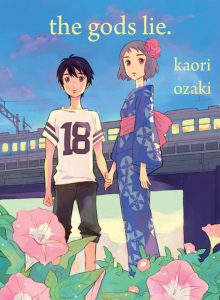By Kaori Ozaki | Published by Vertical, Inc.
 The Gods Lie is a seinen one-shot by Kaori Ozaki, who also brought us Immortal Rain, which I liked very much. Even though it was released recently, Ozaki’s clean and clear artwork somehow conveys a more vintage feeling, a bit like a Miyazaki movie.
The Gods Lie is a seinen one-shot by Kaori Ozaki, who also brought us Immortal Rain, which I liked very much. Even though it was released recently, Ozaki’s clean and clear artwork somehow conveys a more vintage feeling, a bit like a Miyazaki movie.
Natsuru Nanao is in sixth grade and dreams of becoming a soccer star. The girls in his class have ignored him ever since he rejected the princess of the group, so he’s surprised when Rio Suzumura actually acknowledges his presence. After his beloved soccer coach is hospitalized, the negative and demanding replacement causes Nanao to bail on soccer camp and he ends up spending a lot of time over summer vacation with Suzumura and her little brother, Yuuto (and Tofu, the kitten they have rescued). Nanao lives with his mother, since his father died when he was little, but soon discovers that Suzumura and Yuuto are living on their own after their father took off to earn money fishing in Alaska.
Over the course of the volume, Nanao makes some bittersweet discoveries about life. The new coach causes him to doubt his dreams of soccer stardom. He learns that one of his teammates already has a different career path plotted out. He falls in love with Suzumura and stands by her when her dad fails to return by the summer festival like he promised. He discovers her terrible secret. And, lastly, he begins to understand why “the gods lie.”
I think in this case, the gods of the title are taking the form of parents, and how they might appear to a young kid. Suzumura’s dad has lied to his children, but Nanao reflects that his dad had lied to him, too, promising that he’d surely get better if Nanao was a good boy. People who love you can lie to you, sometimes because they don’t want you to be sad, sometimes because they are assholes who are unworthy of your love. That’s life.
What I like best is that Ozaki lets Nanao take in these revelations without destroying his capacity to dream, or ending the book on a thoroughly depressing note. Indeed, the conclusion is downright hopeful. In the end, I enjoyed The Gods Lie very much, and particularly recommend reading it somewhat slowly, to really evoke that leisurely summer vacation feel.
Review copy provided by the publisher.









Recent Comments